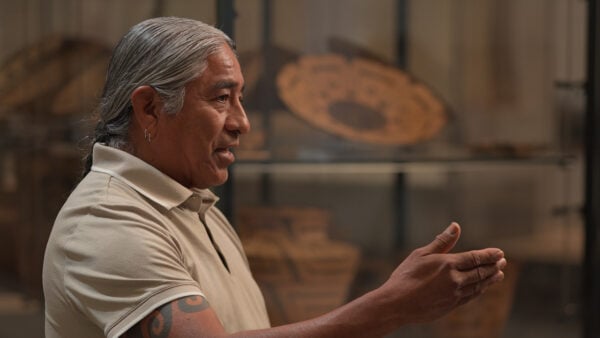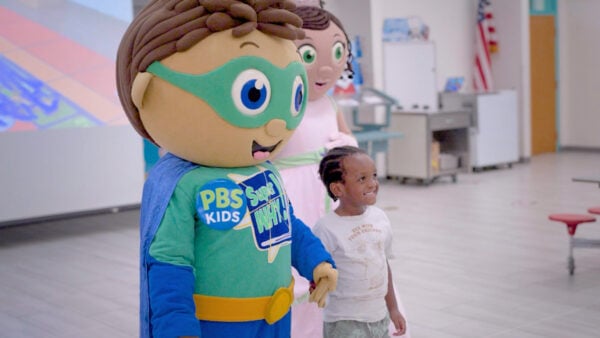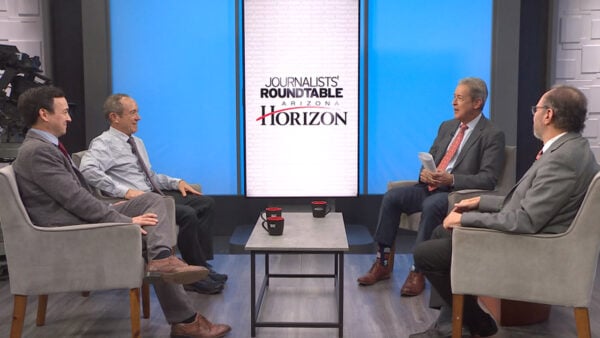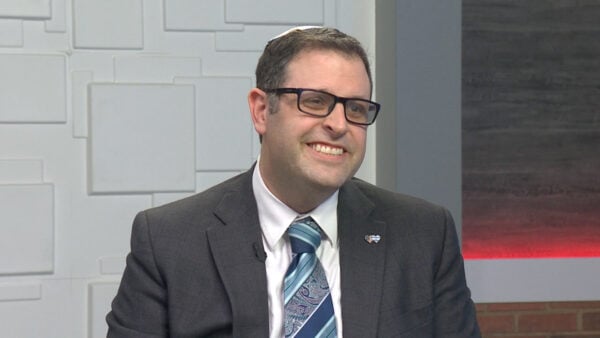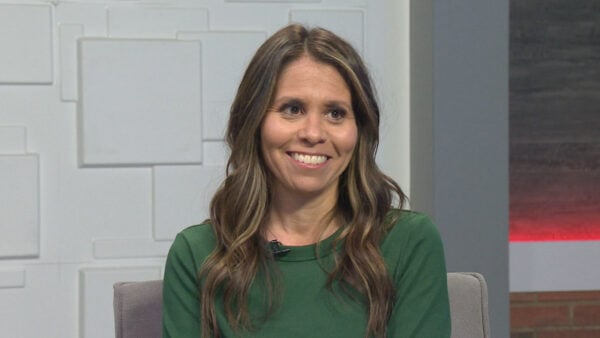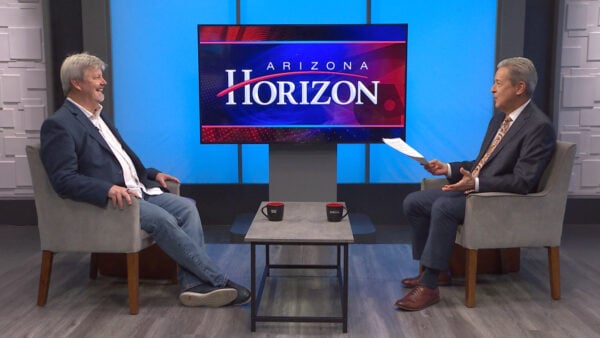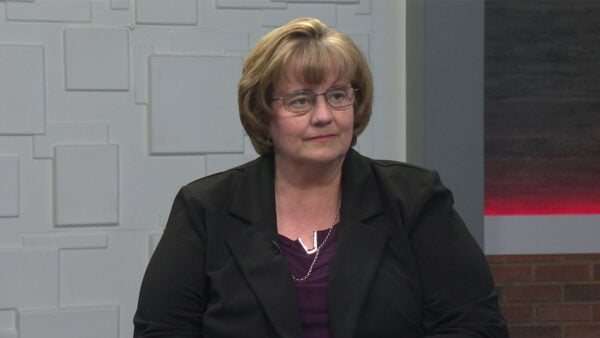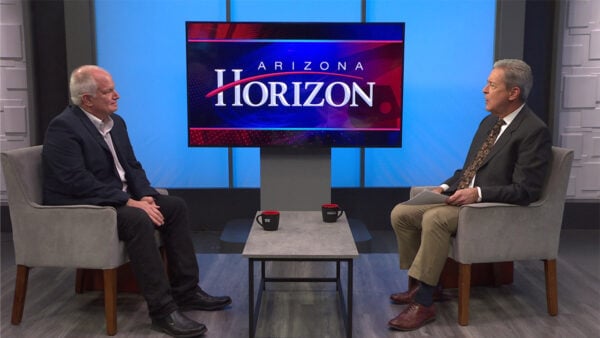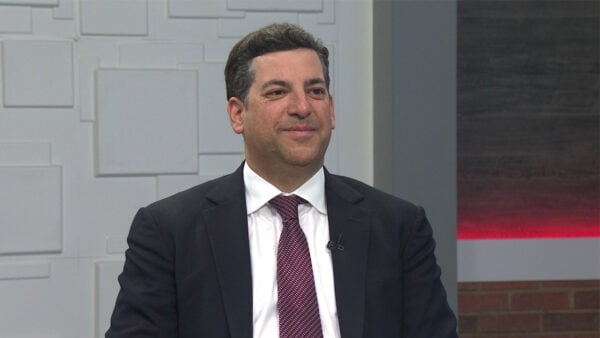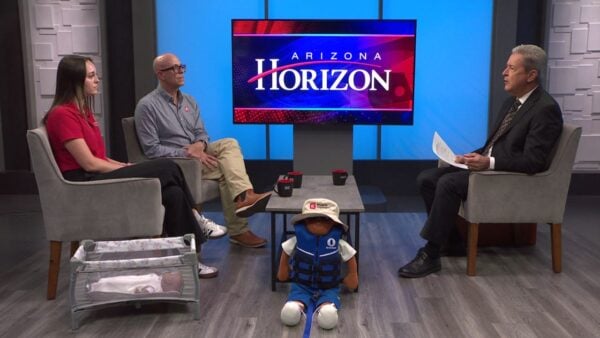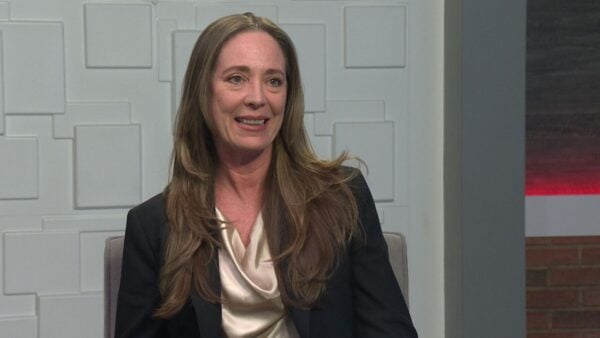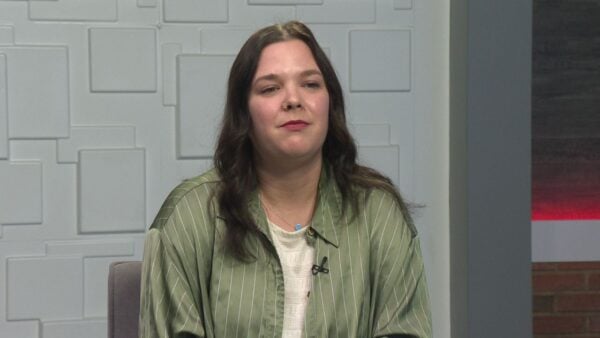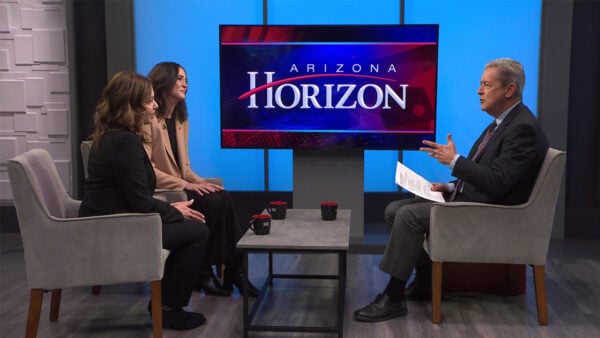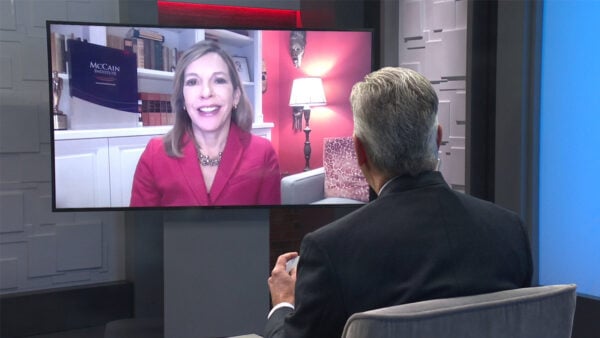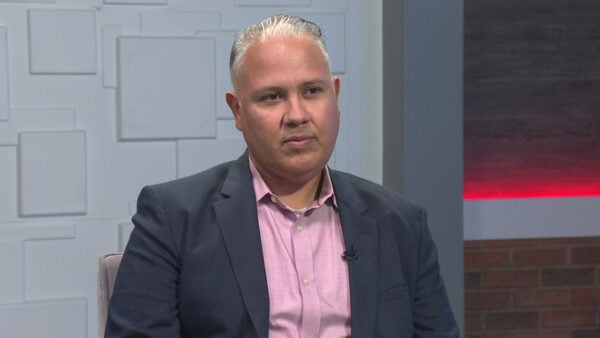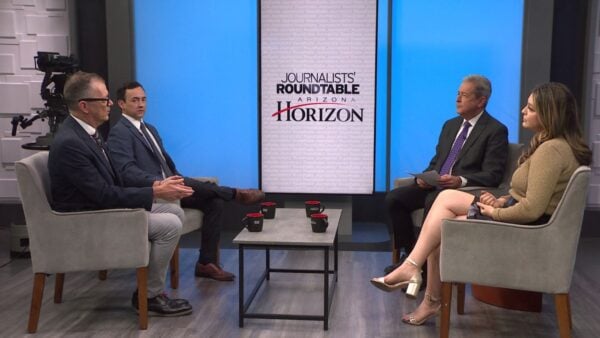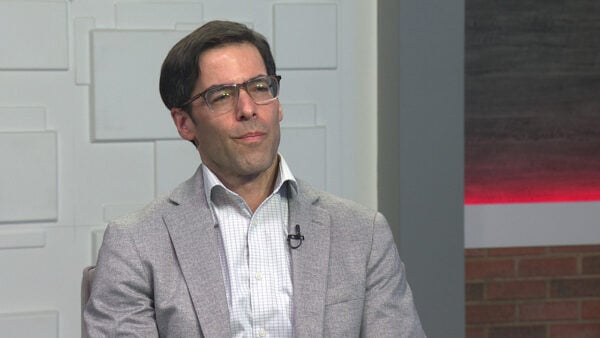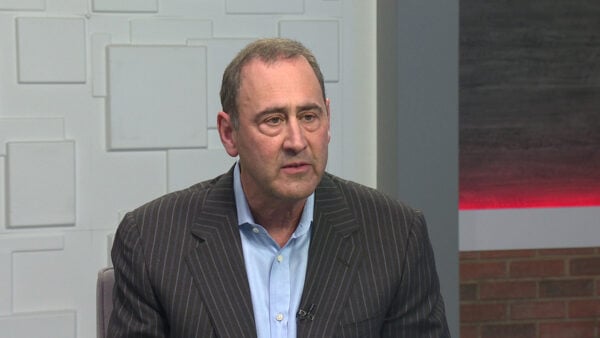The battle between preserving or developing State Trust is heading for a ballot showdown this November. Prop 105 comes from the Legislature, allows 400,000 acres to be saved and limits how the land can be used. It calls for preserving as much as 400,000 acres in state trust land, every acre or parcel of which would have to be approved by the Legislature. Prop 106 is a citizen’s initiative and would automatically preserve 259,000 acres and set aside an additional 358,000 acres that could be purchased by cities and set aside for conservation. The measure would also revamp the state agency with a board of trustees. If ballot measures are approved at the polls, the one with the most votes wins. Parts of the other plan could become law should the winning measure not have the same provision. We hear from supporters of both propositions.
Michael Grant:
Tonight on Horizon, planning and management of state trust land at issue on two competing ballot measures this November. Supporters and opponents of both measures join us. And how much should local governments be able to increase property taxes? We look at prop 101, property tax levies. Plus, an Arizona-based organization that provides relief for the impoverished in Sub-Saharan Africa celebrates 25 years of service. Those stories next on Horizon.
Announcer:
Horizon is made possible by contributions from the friends of 8. Members of your Arizona PBS Station, thank you.
Michael Grant:
Good evening, welcome to Horizon. I'm Michael Grant. The Arizona/New Mexico Enabling Act of 1910 granted Arizona nearly 11 million acres of state trust land. This land is to be held in trust for certain beneficiaries, primarily public schools, then leased or sold to the "highest and best bidder" to provide funds for those beneficiaries. But as the state land department sells off parcels to keep up with Arizona growth and enhance the funds, some worry about how the land will be used. This tug-of-war over state trust land is headed for an election-day showdown. Voters must choose between two initiatives. Merry Lucero looks at props 105 and 106.
Merry Lucero:
The value of preserving open space is intrinsic with its beauty, wildlife habitat and natural resource protection. But the battle over how to manage, sell and develop it has a long history in Arizona. That clash comes to the fore in two competing ballot propositions --Prop 106 called Conserving Arizona's Future and Prop 105 supported by a group called Save Our Trust.
Kim Owens:
Save Our Trust has four areas that is critical to any discussion of state trust land reform. One, increase funding to education; Two, is protection of open space; Three, is the proper planning; and four is accountability. Proposition 106 fails all of these tests. It's the largest give-away of land in Arizona and at the cost of public education.
John Wright:
We have ways to carefully and responsibly develop land in Proposition 106 through good land use management, through preserving some areas as open space in order to increase the value of land. We believe it is going to help and see it can help education funding, conservation, and make a difference in the citizens and communities throughout Arizona.
Merry Lucero:
prop 105 calls for preserving about 43-thousand acres…It additionally calls for preserving up to 4-hundred thousand acres in state trust land. Every acre or parcel of the additional land would have to be approved by the legislature. The measure comes from the state legislature, and limits how the land can be used.
Proposition 106 would automatically preserve 259,000 acres and set aside an additional 358,000 acres and that land could be purchased by cities and towns and set aside for conservation. Prop 106 is the citizens' initiative. There are educators on the board both competing propositions.
Kim Owens:
Currently schools get $25 per student a year out of the state trust land sales. That could go away if those lands are no longer sold but given away or traded or put in preserve.
John Wright: Good planning good management increases the value there's our asset growing and better funding for public schools. Its really about long term planning and that's why those who are interested in the education value of this plan understand this is not a windfall its not an instant increase in funding next year or the year after but it is a long term investment so that we see the slope of our returns of increased funding rise and rise as the value of the land rises and rises
Michael Grant:
Joining me now to talk about the two competing State Trust Land propositions Spencer Kamps with "Save Our Trust" supporting prop 105 and opposing prop 106 and Patrick Graham with "Conserving Arizona's Future" supporting prop 106 and opposing prop 105. This is very complicated. [laughter] Spencer, let me go to you. Why is--why is 106 superior to 105? No. Why is 105 better than 106?
Spencer Kamps:
Because 105 achieves the goals that I think most of the voters care about which is open space preservation and protect the beneficiaries of the trust, the school of the deaf and blind and education communities and minors hospitals. Prop 106 on the other hand--I'm sorry to say--fails on all those tests. It allows conservation to happen anywhere on any state land and doesn't allow return to the trust. If conservation is set on state land and kept in the trust, it's frozen. It's frozen from ranchers doing any improvements like digging a well. It's frozen from infrastructures going across it and no wait education community will receive value if put in a status. Somebody has to manage it. Somebody has to manage the land. The state land department is left with that bill. And that's wrong.
Michael Grant:
Patrick, why is proposition 106 superior to proposition 105?
Patrick Graham:
Proposition 106 presents a great opportunity for people of Montana. When there were trust lands put in place, there were five cows to every person in Arizona. That was long since outmoded. We had a need to bring a balance through the process. Three points I would like to make. 1, proposition 106 conserving Arizona's future conserves nearly 700,000 acres of land and puts in place a planning process that allows the wise development of many acres and remaining acres of state and conservation. And a broad coalition of the supporters from the governors, Phoenix, Tucson, Flagstaff, a whole host of business groups are supporting the measure. Third, unlike what the opponents claim, our measure does not only in fact protect and ensure dedicated funding in schools and enhance through a planning process and the creation of a citizen board to ensure the purpose of trust is maintained in the future.
Michael Grant:
Patrick, it seems to a certain extent isn't prop 106 rewriting, at least the portion of the mission the state trust lands? State trust lands were set aside as we pointed out to benefit certain groups, primarily education, not as public lands in the sense they would be reserved for things like conservation and city use and those kinds of things. Are we rewriting that mission and is that a good idea?
Patrick Graham:
That's a great question. The voters need to know the mission of the trust will stay intact under this provision. What we're doing is providing additional tools and opportunities. When we talk about the future of Arizona, we're faced with the choice of sprawl and leapfrog development. We have the choice of orderly development that gives the communities the choice to direct development, out land appropriately and compensates the trust that is in the best interest to conserve the lands.
Michael Grant:
On the flip side of that, Spencer, we have 100 years on that process. Things have changed. There is a universe of some 9 million acres left. Why not rethink only a portion of the mission where it makes sense to set aside lands, move them out of the revenue making the category do that.
Spencer Kamps:
That's the only area of agreement reform should happen. Proper 106 doesn't do that. It's a giveaway. Number one, Pat, mentioned board. You have an unqualified board set in charge to of acres of land. They have the authority to joint ventures and authority to set aside conservation land. No value return. You only get value if you sell it. There's no requirement in prop 106 that you get. You get value if you sell the land. That's a serious flaw.
Michael Grant:
Back to my point this would represent--I'm always doing fast math which is tricky--about 8% of total assets.
Spencer Kamps:
Yeah.
Michael Grant:
Why not say for an appropriate 8% we will try to maximize its value? We're going to do something else with it?
Spencer Kamps:
Our issue is how you manage the remaining 8 million acres. Relates to setting aside land. Always been supportive of open space preservation and proponent which prop 105 allows and the beneficiaries.
Michael Grant:
Now Patrick, on the board of trustees I think prop 6106 establishes rules.
Patrick Graham:
Seven member citizens could be appointed only if you have the qualifications. It specifically states you have to have experience on the matters that come on the board to ensure on complex issues that the land commissioner not a single appointed official but a board of individuals with experience provide a sounding board and guidance about important decisions, about how the land is developed and conserved in the future.
Michael Grant:
Why do we need that though? It's been run fairly well the past 100 years or so. You have the jokes about committees designing elephants, things along the lines. Why tinker with the system if it is not broke?
Patrick Graham:
The system is badly broken. We understand people profit from the current system the way it is. The schools are not profiting from it. We have over 200,000 acres of land in the Phoenix and Tucson metro area that is--of it suitable for development and sitting there while development is leapfrogging over it causing sprawl and traffic problems and sitting there. The system is badly broken.
Michael Grant:
Spencer, there is some support for that. State land itself maintaining for a long time it needs new tools to pull itself into the 21st century when in many instances is a phenomenally valuable assets and say they don't have the tools.
Spencer Kamps:
Yeah, the reform is if the 106 doesn't help with the situation. Unqualified board, I disagree. They are unqualified. According to initiative they have to have substantial involvement--excuse me--matter within the board's authority. They get the ability to sweep 5-8% of the money that would go in the funds of education community to manage state lands, huge significant change from the existing structure. Bad reform in our opinion. They are given unlimited authority to redefine what's the highest and best bid. In the constitution, little specifics, what are we talking about here?
Michael Grant:
Does 105 do anything to improve the bang for the buck?
Spencer Kamps:
Absolutely. It allows through the planning process no goal gets put above each other one. Conservation, infrastructures, development, community needs are all planning goals and makes the value transfer happen at the time of disposal. Proposition 106 is paying us in future. Like buying a car off the car dealership and not paying a dime. You shouldn't be able to do that with education funding. It's ridiculous.
Michael Grant:
Should we gamble on the income, is that something we should do?
Patrick Graham:
Proposition 106 provides the necessary tools. The specificity comes to where the laws are put in place. It's not an appropriate place to write laws through initiative. You do that through the legislative process. The legislature will decide the parameters for the tools we're putting in place. We need to give the land department the tools they need so the schools and classroom funds--could receive the funding they should have been receiving the last 20 to 50 years. It's not happening, and it's got to happen. It's not about building houses but about building communities. We have an opportunity in the state of Arizona to build communities in the open space and development in the balance of a way to provide for a better quality of life.
Michael Grant:
Spencer, what about the allegation, I read headlines in the paper that we are getting record prices for state land. Is the current system falling down?
Spencer Kamps:
I think it is something we ought to be proud of. The land department made $500 million for the permanent fund for k-12 school system. They are getting unprecedented amounts of money than years past from the sale of state land. Should we have open space? Absolutely. Should the tools be put in place to protect the education community? Sure. When we're 49th in the state, 49th in the nation when it comes to the education funding to take away their future revenue strain is a bad idea.
Michael Grant:
Does it really do that? Even at max its 700,000 acres in a universe of 9.3 million.
Spencer Kamps:
I'm not talking about the upfront set aside. I'm talking about management of the 8 million acres, the remaining portfolio on the state trust. We have a beautiful position of land available and provide revenues and allowing anywhere in the state of Arizona not even the urban envelope. Prop 105 does. It focuses all the planning tools on the urban envelope where they are in need of development.
Michael Grant:
Patrick, almost out of time. Last word.
Patrick Graham:
This proposition wouldn't be supported by the governors of the Arizona, mayors of cities, the Arizona business association, by the business coalition, by the superintendent of public schools if this did all the things they allege. It doesn't do the those things. It creates the tools this state badly needs to provide opportunities for conservation, wise development and good schools.
Michael Grant:
Okay, Patrick Graham and Spencer Kamps, thank you for joining us. Tough putting those two together, but we did it.
Michael Grant:
A measure which goes for a vote in the November's general elections ballot could place limitations on how much local governments can increase property tax. Supporters of the measure say the change is long overdue, especially for a system which has not been updated for 20 years. Some disagree, and say the measure could be unfair to small towns which are fiscally responsible. Nadine Arroyo introduces us to proposition 101.
Nadine Arroyo:
Proposition 101 also known as 2006 taxpayer protection act places the cap on property tax. Prop 101 ensures that voters have a say when tax increases are proposed and increased tax limits are placed on local government.
Farrell Quinlan:
We feel prop 101 is a welcome change to the system, an update because it will lower the capacity of localities to raise taxes that would harm businesses and residents, too.
Nadine Arroyo:
In 1980, limits were set on the amount government entities in Arizona could tax properties. Those limits increase 2% every year. Proposition 101 would reset those limits to actual property taxes levied in 2005 and increase those limits by 2% annually and account for new construction. Also the measure would eliminate taxes capacity currently not used by governments.
Farrell Quinlan:
Every year since 1980 there's a ratcheting up of their ability, capacity to raise taxes. All this would do is reset the clock so to speak to 19--I'm sorry to 2005 and hopefully that will keep a lid on the ability of some locality to really increase taxes remarkably and do it without voter approval.
Nadine Arroyo:
The league of Arizona's cities and towns says although it sees the prop the least harmful option to the issue of reducing taxes they are concerned about the message it sends.
Ken Strobeck:
In the state we have only 47 of the 90 cities and towns have a primary property tax. Of those only 30 were at the maximum and so by taking away this capacity what you're really doing is saying those of you who had the capacity but didn't tax clear up to the top of that, you're going to lose that. You're sort of punishing the good players who have been responsible and not raising taxes.
Nadine Arroyo:
What cities or towns have been affected by a proposition like this?
Ken Strobeck:
In the valley I think Glendale is the city that stands to lose the most capacity. We've also heard from flagstaff and Yuma because they actually had planned and budgeted to increase incrementally some of their local property taxes because these went through the legislature on the ballot. They are not able to collect that even though they budgeted for it. They are impacted not to collect what they anticipated. Glendale, on the other hand, looks to lose future capacity. It wasn't built into a budget.
Michael Grant:
We continue the coverage of the propositions tomorrow. There is a Scottsdale-based organization that, while little known here in Arizona, is renowned around the world for its humanitarian work. The international foundation for education and self-help, IFESH, was founded 25 years ago by the Reverend Leon Sullivan, a visionary leader and Baptist Minister. The organization helps regions in Sub-Saharan Africa to reduce hunger and poverty, empower local communities, and raise the standard of literacy. IFESH also fosters cultural, social and economic relations between Americans and Africans. IFESH is gearing up for a 25th anniversary celebration on September 25th with speakers and a workshop on corporate social responsibility and advancing education in Africa. Dr. Julie Sullivan, President and CEO of IFESH, joins us. And we welcome you.
Julie Sullivan:
Thank you. Good to be here.
Michael Grant:
Why did your father found IFESH? What was his hope?
Julie Sullivan:
It was founded by my father and he wanted to impact poverty reduction in Sub-Saharan Africa. He wanted to do so because he had a saying as people don't need so much a handout as a hand up. The work of IFESH has helped the poor become self- sufficient. We have worked in 34 African countries and the main emphasis is education and conflict mitigation and peace building.
Michael Grant:
Obviously there are a lot of areas of the world that have a variety of different problems unfortunately.
Julie Sullivan:
Yes.
Michael Grant:
Why Sub-Saharan Africa?
Julie Sullivan:
All over the world there is pressing concerns. All over the world people have helped the tsunami relief effort and Katrina but I believe Africa has been overlooked. You have devastating poverty there has shown through the H.I.V./AIDS pandemic and a moral and ethical way to address Africa. If the community had addressed the genocide in Darfur, perhaps we would not see the kind of devastation that continues to exist. In fact we could probably increase our moral standing as a country if we address the issues of genocide in Darfur and issues of poverty throughout the world and not forget Africa because it's a continent that's deserving of attention.
Michael Grant:
What are the major programs of IFESH? How does it go about its mission?
Julie Sullivan:
Sure, we work in cooperation with the local people and communities. Our major emphases is on education because we believe and research shows that education is correlated with income and child well being. A lot of focus is on helping to train people. We have trained over 178,000 teachers, for instance. We have built over 200 schools. We've sent over 900 American volunteers all to support the social reform agendas within those countries. We help to prioritize African government to think more about poverty. One of the things we Americans have a difficult thing to understand is what does it mean to be a hungry child? What is malnutrition? We don't see it in our normal day and day environment. I teach them to become self-sufficient in their lives and bring the awareness of poverty into the lives of American people.
Michael Grant:
Biggest challenges as you celebrate the 25th anniversary.
Julie Sullivan:
I'm glad you asked about the 25th because we're delighted that international and national and state and local leaders will help us celebrate 25 years of IFESH on September 25th and theme is the cooperate social responsibility, advancing education through public, private sector support. The biggest challenge we face is the American people believe in helping people that's been demonstrated. What we need it do is address the moral empiric of helping the poor. We have apathy identity crises. That means we tend to think of the poor as someone else. Someone that is not our neighbor but really the humanitarian imperative is to help the poor.
Michael Grant:
Is it apathy so much as it perhaps is focus on different regions of the world? You point out Americans do step forward in different circumstances?
Julie Sullivan: A
bsolutely. I have reason for hope because you see people stepping out like you are finally getting attention from the highest levels of governments and through multi-and bi-lateral to affect the poor in Africa and I think the reason is that people understand, yes, you have a war in Iraq. Yes, you have these pressing concerns. They know that H.I.V./AIDS is not going to go away and the problems of the poor are not going to go away until people like you and I address them.
Michael Grant:
Doctor Julie Sullivan, thank you very much for joining us. Congratulations on your 25th anniversary.
Julie Sullivan:
Thank you.
Michael Grant:
For transcripts of Horizon and to see what's on upcoming programs please visit our web site at azpbs.org and click on Horizon. Thank you very much for joining us this Tuesday evening. I'm Michael Grant. Have a great one. Good night.
Spencer Kamps:Save Our Trust;Patrick Graham:;Dr. Julie Sullivan:President and CEO, IFESH;

